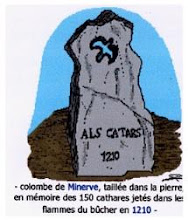![]() Book Release: The Templars & the Grail
Book Release: The Templars & the Grail
![]() Now available 2007: The Knights Templar Encyclopedia
Now available 2007: The Knights Templar Encyclopedia
The Cathars of the Languedoc were dualist heretics who probably presented the greatest doctrinal challenge faced by the Catholic church in the twelfth and thirteenth centuries. The word Cathar comes from the Greek katharos, meaning pure. They Cathars professed a neo-Manichaean dualism - that there are two principles, one good and one evil, and that this world, the material world, is evil. Similar views were held in the Balkans and the Middle East by the medieval religious sects of the Paulicians and the Bogomils, with whom the Cathars were closely connected.
They were dissident, pacific Christians who would not accept the orthodox position that an omnipotent and eternal God could possibly have been responsible for the material world of matter, as to them, this world was the product of an evil creator, not a good one. To the Cathars, as Dr. Malcom Barber states in his latest work, The Cathars, such a Creator was "either a being fallen from the perfection of Heaven who had seduced a proportion of the angelic souls there and then entrapped them in matter, or, he was a co-eternal power, quite independent of the Good God of the spirit. The only release for those souls encased in the material prison of the body was through the Cathar ceremony of the consolamentum, which was the means by which they could return to their guardian spirits in Heaven." (p.1)
The Cathars believed that matter was evil, and that Man (Humanity) was an alien sojourner in an essentially evil world. Therefore, the main aim of Man was to free his spirit, which was in its nature good, and restore it with God. They had strict rules for fasting, and were strict vegetarians. The Cathars also allowed women to be perfecti, i.e., priests. They did not believe in a Last Judgement, believing instead that this material world would end only when the last of the angelic souls had been released from it. They believed in reincarnation, and that souls could take many lifetimes to reach perfection before their final release.
In many ways, Catharism represented total opposition to the Catholic church, which they basically viewed as a large, pompous, and fraudalent organisation which had lost its integrity and "sold out" for power and money in this world. The Cathars could also not accept the orthodox beliefs regarding the Eucharist, and other sacraments of the church, as this implied that Christ would have actually lived on this earth in the flesh, been crucified, and resurrected from this evil, material world - something that they felt a divine, good Being like Christ could never do in the first place, as God (i.e. Christ, in the orthodox Christian view) would never exist in this material world, only in Heaven. So, they rejected a fundamental tenet of the orthodox church: the Incarnation.
The Cathar church was organised into dioceses, who bishops presided over an order of succession consisting of elder and younger 'sons', deacons, and perfecti and perfectae, their priesthood. Many supporters were among the nobility of the Languedoc, which was one of the most sophisticated, wealthy and cosmopolitan civilisations in all Europe at the time. Many lay people supported the perfecti (priests) by becoming credentes, and most took the consolamentum when near death, as the hard, ascetic rigours of the life of the perfecti were too demanding for the average person. So, they could marry and have a family, while the perfecti lived a monastic life; it is also known that the Cathar perfecti travelled in pairs while doing their ministry. They were successful healers and doctors, and knew a great deal about herbalism. Overall, the Cathars had a large number of followers, and the greatest success in southern France and northern Italy. Soon, with such radical beliefs and large numbers, they became a definite threat to the Catholic church, and the Inquisition was finally launched on them, culminating in one of the bloodiest, ruthless crusades the world has ever seen.
Various crusades were preached to the Cathars first, but to no avail. Bernard of Clairvaux was known to have said that he thought they lived basically good lives, yet heretical, but others took a more severe line. Eventually, as all else seemed to fail, a policy of violence was instigated by a desperate church, resulting in many deaths and atrocities, fuelled by the greed of northern French barons who supported the crusades against the wealthy Languedoc in the south. The Inquisition persisted in earnest and, in some cases, whole villages or cities were annihilated, including women and children, and even Catholics, with the justification by the church that this serious heresy must be eliminated no matter what the consequences. Arnold Aimery, the Papal Legate at the siege of Beziers, ordered his men: "Show mercy neither to order, nor to age, nor to sex....Cathar or Catholic, Kill them all... God will know his own....". Catharism finally vanished from the stage of history by the end of the 14th century. But, since the final, fateful siege of Monsegur in 1244, the Cathars, and their memory, continue to fascinate many people today.
Dr Karen Ralls
2000-2008
READING LIST
About the Cathars...
|
Illustrated lectures and more detailed seminars
by Dr Karen Ralls can be arranged.
Please contact Ancient Quest for details.
Ancient Quest, and Dr. Karen Ralls, do not necessarily agree with, or endorse, material in the publications noted above, but provide this list as a general introduction to learning more about this topic.









No comments:
Post a Comment